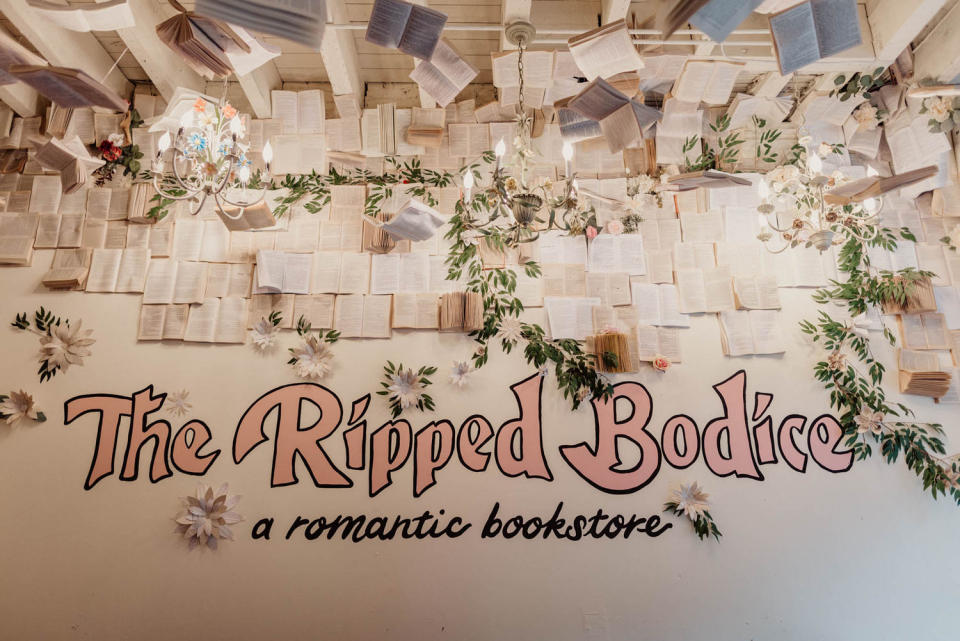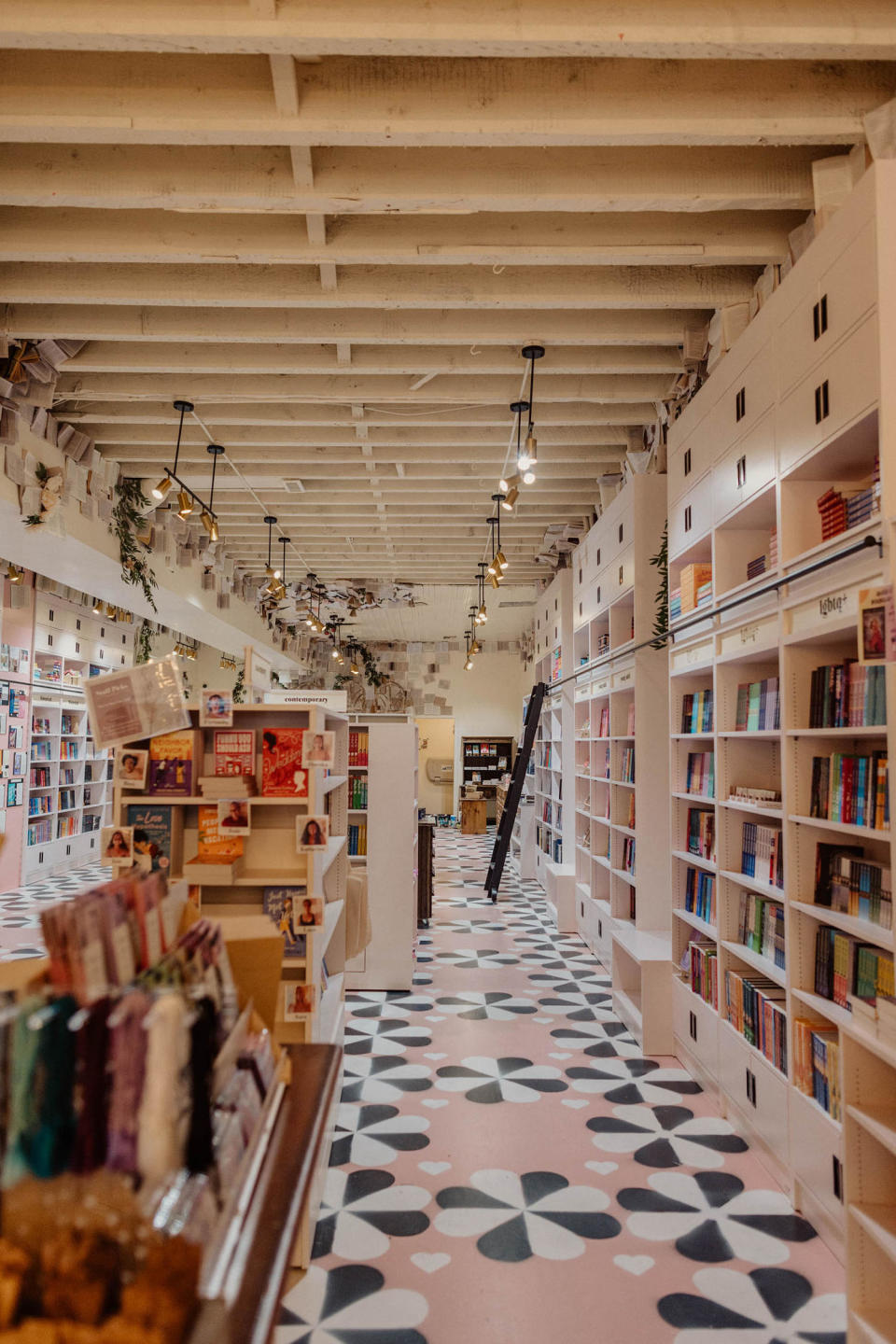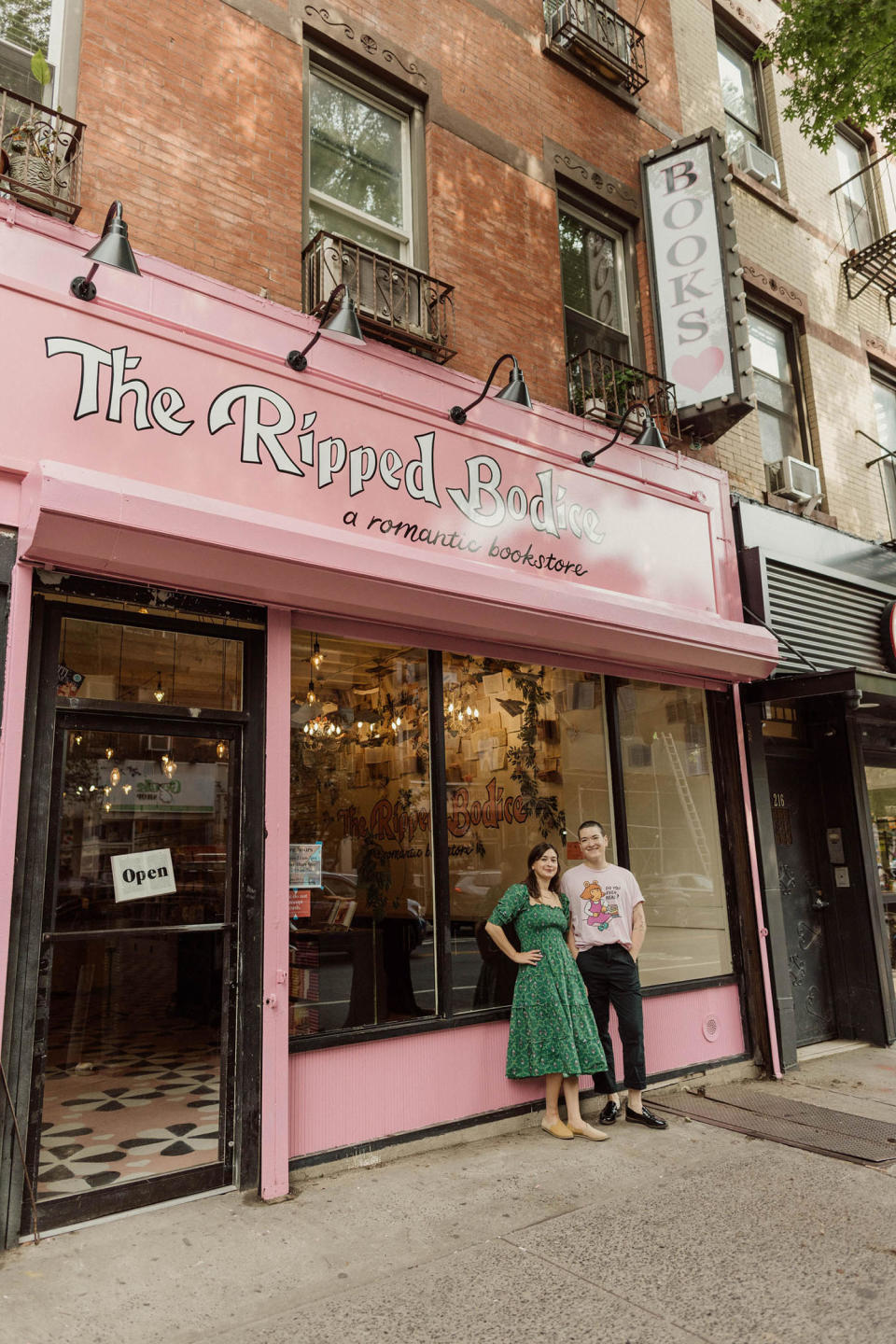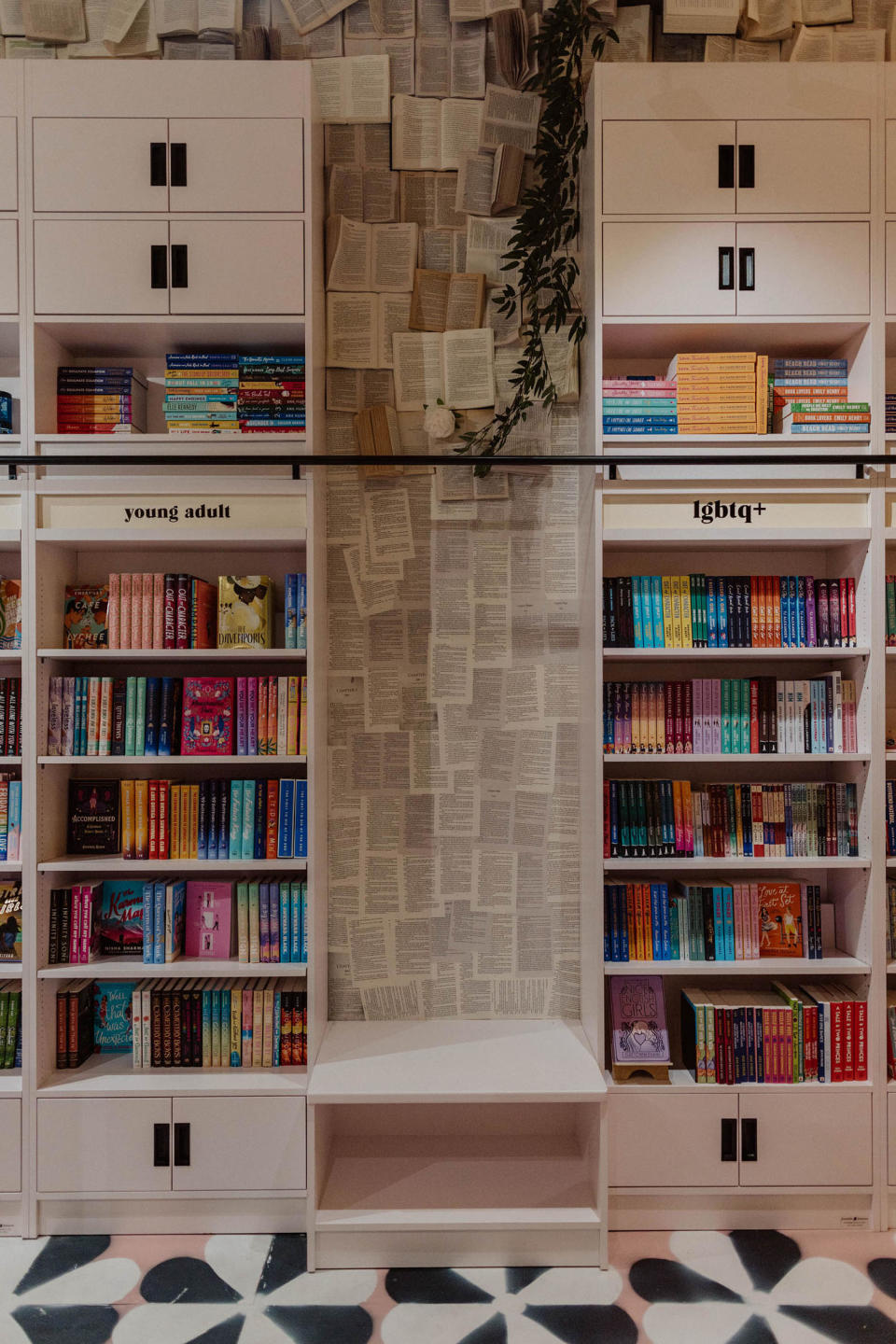The romance genre is on the rise. The Ripped Bodice bookstore is meeting readers there
The beloved teen book-turned-romantic comedy “To All the Boys I’ve Loved Before” opens with its main character in a red gown staring across a field at her beau in a tussled white shirt.
The protagonist, Lara Jean, is imagining herself in one of her favorite romance novels. Later, when Lara Jean tells her best friend about her latest read, she responds, “Another bodice ripper, you little perv?”
The country’s first romance-only bookstore seeks to flip the narrative represented by that moniker on its head. When sisters Bea and Leah Koch set out to name their project, they embraced the so-called "bodice rippers" they, like Lara Jean, grew up reading.
And the Ripped Bodice was born.

The name comes from older sister Bea Koch's master's thesis, which focused on fashion and historical romance novels, titled "Mending the Ripped Bodice."
A play on the often derogatory term for romance novels first used in the '70s and '80s, it felt like a "perfect" name their bookstore passion project, Leah Koch tells TODAY.com.
"I liked that it was a little bit tongue-in-cheek," she says. "We take our business seriously, but we don't take ourselves seriously. It was exactly what we wanted to do, which is reclaiming language."
The Ripped Bodice first opened in Los Angeles, California in 2016 after the sisters launched a Kickstarter fund, which raised nearly $100,000.
Conversations about expanding began in January 2020, Leah Koch says, but those plans “ground to an immediate halt” with the onset of the COVID-19 pandemic. They resumed their planning around August 2022 and successfully opened a second location in Brooklyn, New York last August.
In addition to serving readers on both coasts, the store represents a broader mission: Advocating for a genre that is often looked down upon, encouraging readers to reduce stigma in their own lives and moving the genre forward by spotlighting gaps in diversity.
The Koch sisters intimated what the rest of the world is catching onto: Romance is on the rise, and the Ripped Bodice is meeting readers there.
By romance readers, for romance readers
Walking through the door of the Brooklyn Ripped Bodice shop, patrons are greeted by rows of white bookshelves, neatly labeled with categories like "paranormal," "LGBTQ" and "erotica." It seems like all genres, tropes and flavors of romance are given equal prominence, and are equally visible.

"It's treated as all normal, and a fun thing to shop for," Leah Koch says of the novels. The store also sells bookish accessories, "because you could want a really dirty erotica book and a tote bag that says 'I heart books,'" she says.
The goal is to meet people where they are in their relationship to romance, from a beginner's curiosity to a highly curated taste in tropes.
"If someone walks through the door and asks for a story about cowboys that are also werewolves, the bookseller's reaction should go along the lines of, 'Fantastic, there's this new series that came out last week,' instead of anything that might make a reader feel strange about their tastes and preferences," Leah Koch says.
"That's a pretty tame example," she adds. "Someone could be like, 'I want a threesome where they all end up together at the end'... We have a lot of serious follow-up questions, as opposed to, 'Gross.'"

Falling in love with romance
Leah Koch was about 12 years old when she read her first romance novel. She can't remember that title, but the one that sticks out as the book that made her love love stories is Nora Roberts' Bride Quartet series, starting with 2009's "Vision in White," which follows four friends who own a wedding planning business in Connecticut.
"They have this cool job, and they get to live with their best friends and then the perfect person just strolls along," Leah Koch recalls.
Bea Koch also started reading romance around age 12, her sister remembers.
Neither of their parents were romance fans, but in their household, reading and a focus on the sisters' education was paramount. Leah Koch recalls going into bookstores with her family, both on vacation and in their hometown of Chicago, and being encouraged to seek out stories that interested her and her sister.
Bea Koch, already interested in history, found that the boundary between historical fiction and romance sections blurred. Add in a passion for fashion and the elaborate gowns often found on romance covers — and she simply "stumbled" into the genre.
But her younger sister represents a "more typical story" told among readers, where "somebody in your life, whether it's your mom, babysitter, older sister, friend, whatever, kind of slips you (a book)," she says.
"Or, I think, in my case, I just took it," she continues with a laugh.
If 12 seems like an early age to start reading adult romances, Leah Koch notes that the young adult genre was more limited when she was growing up than it is now. It was hard to find stories about "ordinary kids." Instead, she was surrounded by stories filled with angst — like a terminal illness or a painful relationship with parents — or, of course, dragons.
"I think for that reason, I was really drawn to how much weight and importance was given to people's inner emotional lives and mainly ordinary people," Leah Koch says.
Stigma surrounding romance novels, live and in person
Growing up, the sisters didn’t know that anyone might look down on their preferred genre of books.
They’ve since learned this is not the case for many romance readers.
“So many people have the experience at some point during their adolescence of somebody in their life being like, ‘Why are you reading that?’” she says.
A 2020 study analyzing the reputation of the romance industry put it simply: “Society sees romance fiction as ‘trashy.’”
“Romance has been seen as lesser. And one of the reasons is because it’s associated with women’s desires and women’s pleasures,” Krupa Shandilya, an associate professor of sexuality, women’s and gender studies at Amherst College who teaches a class on the romance genre, tells TODAY.com.
One of Leah Koch's first brushes with the stigma surrounding romance novels came when the sisters launched their campaign efforts for the store.
“Up until the day we hit publish on our Kickstarter, it did not occur to me for one single second that anyone would give a s--- about what we named our bookstore, and it still it weird to me that anyone gives a s--- about what we named our bookstore,” Leah Koch said. “But, whatever.”
The Koch sisters came face-to-face with romance's reputation after after they launched their Kickstarter campaign and were hit with a wave of vitriol, which was "jarring and hard."
While there were "many people" who were thrilled at the prospect of a romance-only bookstore, "obviously, people who generally don't like something are generally louder," she says.
The criticism primarily came from three generalized camps, she explains: "finance bros" asking why a new business would limit itself to one genre, the "religious and political groups" operating under the assumption that "romance novels are inherently evil" and lastly, established romance readers who are "leery of outsiders."
"Especially older generations, they've spent so long having to defend their interest," she says.
People are less likely to say "crazy s---" in person, she notes. But it still happens "all the time" at The Ripped Bodice.
How the romance genre and its perception has evolved
The sisters say they're often asked if they thought their business would be as successful as it is when they launched.
"Why would I open a business I didn’t think was going to be successful?” Leah Koch says. "If you know anything about publishing or if you've ever spoken to a woman before — why are you so surprised?"

Public perception of the genre started shifting in 2020, Shandilya says.
"Having taught this class multiple times, since the release of 'Bridgerton,' I think there's been a great change in how romance is perceived as a cultural phenomena," Shandilya says.
The Netflix series, based on Julia Quinn's romance novels of the same name, premiered in December 2020, and quickly became the platform's most watched series at the time, according to Deadline. A lush steamy drama set in Regency England, "Bridgerton" put a spotlight on female pleasure from "day one," the show's intimacy coordinator, Lizzy Talbot, previously told TODAY.com.
In addition to "Bridgerton," 2020 also saw growth in BookTok, the bookish corner of TikTok that grew exponentially while both longtime readers and bored nonreaders were at home during the COVID-19 pandemic.
By 2021, the New York Times reported that BookTok had become a powerful marketing tool for publishers and booksellers, and today, some of the most popular genres are romance, fantasy and the hybrid known as romantasy.
While Shandilya believes the romance genre is becoming more societally acceptable, she notes, “As long as it keeps getting consumed by women, it’s always going to be seen as lesser. And that’s just a mark of the patriarchal society we live in.”
In addition to increased visibility of romance through big-budget adaptations and social media, the genre has also strived to become more diverse.
Since 2016, The Ripped Bodice has published an annual report entitled the State of Racial Diversity in Romance Publishing, which tracks the publication of books written by authors who are Black, indigenous or people of color as a percentage of total releases. The report comes from publicly available information about the number of romances published each year and authors. The data is available in a table, found on The Ripped Bodice’s website.
The data, collected annually 2016 to 2023, shows some improvement, Leah Koch says. Industrywide, 10.2% of books were written by non-white authors in 2023, compared to 2016’s 7.8%.
This data also influences how the store is stocked.
“Let’s say ABC publisher is putting out like 100 books a year, and according to that percentage, 12 of them are by a non-white author. We’re ordering all 12 of those,” she explains.
“We’re just always going to prioritize queer, not-white books,” she adds. “But we’re only one bookstore.”
Just one bookstore, standing in front of its customers, asking them to embrace what they love.
“I think lots and lots of people are interested (in romance), and for whatever reason, just have not like taken that leap. They’re overwhelmed by all the choices, which is totally valid,” Leah Koch says. “Part of the point of this shop is to joyfully greet them where they are."
This article was originally published on TODAY.com

